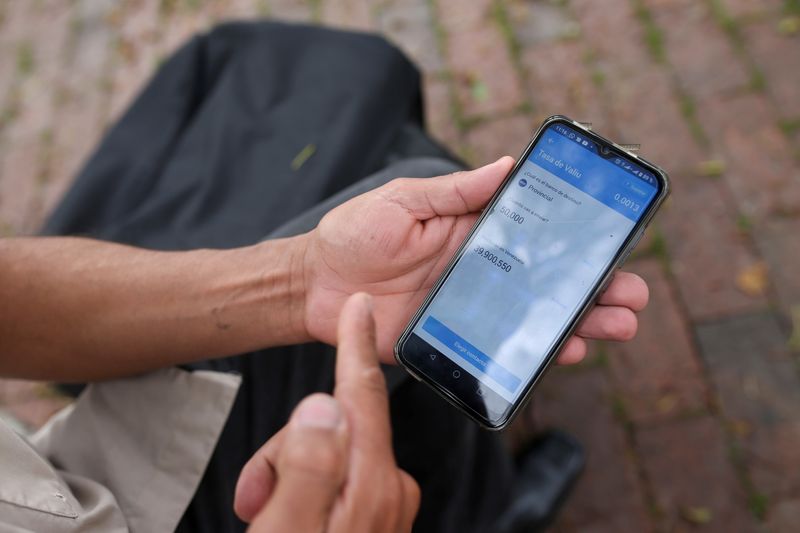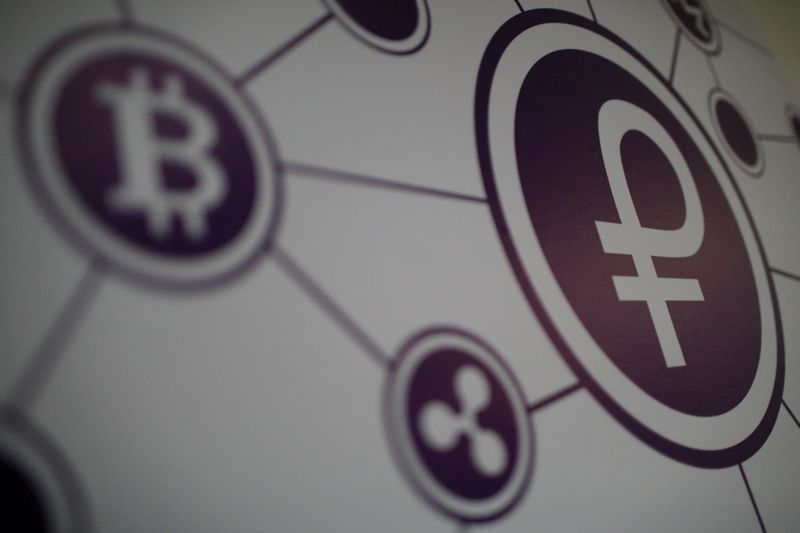By Brian Ellsworth
CARACAS (Reuters) - Venezuelan food delivery driver Pablo Toro has no stake in cryptocurrency or blockchain, but indirectly uses digital tokens every time he sends money to his family.
Toro, who emigrated to Colombia in 2019, uses an app called Valiu to receive Colombian pesos from working on Bogota's streets and deposit the corresponding bolivars into a Venezuelan bank account.
In Venezuela's economy, mired by hyperinflation and hemmed in by sanctions, the operation is not so straightforward.
Valiu uses pesos to buy cryptocurrency that it then sells on LocalBitcoins, a global peer-to-peer site for trading tokens in local currencies.
For Toro, the platform is more reliable than informal money changers, the main channel for Venezuelan migrants to send money home. And he need not buy traditional money orders in person.
"When the power is out in Venezuela, when internet service is down, it has a huge impact on how long it takes to send a remittance to one's family," said Toro, who quit working as a university security guard because his monthly salary could not even pay for a day's groceries.
"(Now) I don't have to worry about whether the cell signal dropped in Venezuela, or if cell service drops here."
As hyperinflation and U.S. sanctions disrupt Venezuela's economy, cryptocurrency is emerging as a way to provide services handled elsewhere by the traditional banking system.
It has become a tool to send remittances, protect wages from inflation and help businesses manage cash flow in a quickly depreciating currency, according to interviews with crypto users and experts.
Cryptocurrency in Latin America got renewed attention in June after El Salvador adopted bitcoin as legal tender. It has grown in popularity in Argentina as inflation resurged.
Chainalysis, a startup that researches blockchain transactions, in a 2020 report ranked Venezuela third on its Global Crypto Adoption Index, largely due to the high volume of bolivar transactions.
Mining cryptocurrency - using high-powered computers to solve complex math problems - is an attractive way to make extra income thanks to Venezuela's ultra-low power prices, but the average citizen cannot afford the equipment.
In Venezuela, crypto is mainly used to hedge against inflation that causes bank deposits to sharply depreciate in weeks or even days.
"Valiu buys and sells bitcoin instead of directly exchanging pesos to bolivars because of the lack of availability of that currency in regulated marketplaces," said Alejandro Machado, Valiu's head of pilot programs.
Bolivar transactions on LocalBitcoins are the largest by value among Latin American currencies, according to LocalBitcoins data analyzed by blockchain advisor UsefulTulips.
LocalBitcoins did not respond to a request for comment.
Cryptocurrency traders and experts say volumes on the site have slipped amid the rising popularity of Binance, one of the world's largest cryptocurrency exchanges, which offers trading of a variety of tokens.
These include so-called "stablecoins" whose values remain steady against specific assets such as the U.S. dollar, avoiding the volatility of many cryptocurrencies.
Bolivar operations on Binance's peer-to-peer platform have risen by 75% since May, making Venezuela the only Latin American country whose trading volumes have risen since bitcoin prices tumbled at the start of May, a Binance spokesperson said.
Venezuelan President Nicolas Maduro in 2017 announced the creation of the state-backed petro cryptocurrency, but it has little practical application. The government used it in 2019 to make small payments to retirees, and often uses it as a unit of value to price services or fines that are ultimately paid in bolivars.
The United States in 2019 imposed broad Venezuela sanctions that block U.S. citizens from dealing with Maduro's government. While banks can still deal with private businesses or individuals, many avoid doing so due to perceived regulatory risk.
The country's information ministry did not respond to a request for comment.
Fast food chains Pizza Hut and Church's Chicken as well as some supermarkets are accepting tokens such as bitcoin and dash as payment, fueling excitement and filling malls and businesses with logos for well-known cryptocurrencies.
But a major part of Venezuela's crypto operations involves businesses swapping out of bolivars to beat inflation, said economist and finance expert Aaron Olmos.

"Crypto is being used as a palliative for the economic situation, but you see it mostly among businesses," said Olmos.
"Nobody is going to tell you 'every night when we do the books, we convert bolivars into bitcoin,' but yes, this is happening."
